Finland and Sweden Apply to NATO, Turkey an Obstacle
A diplomatic nightmare brewing since last week is now upon us.
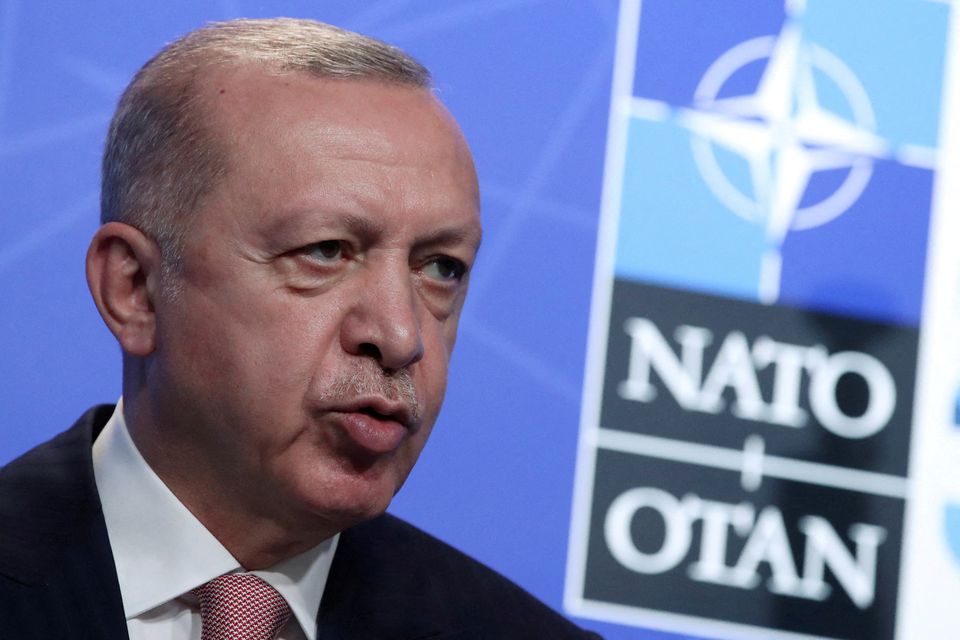
After weeks of foreshadowing, Finland and Sweden have made it official. Reuters:
Finland and Sweden formally applied to join the NATO alliance on Wednesday at allied headquarters, a decision spurred by Russia’s invasion of Ukraine, but face objections from Turkey to an accession process that is expected to take only a few weeks.
Neutral throughout the Cold War, Sweden’s and Finland’s decision to join NATO is one of the most significant changes in Europe’s security architecture for decades, reflecting a sweeping shift in public opinion in the Nordic region since Russia’s Feb. 24 invasion.
“This is a historic moment, which we must seize,” NATO Secretary-General Jens Stoltenberg said at a short ceremony in which the Swedish and Finnish ambassadors to the alliance handed over their application letters, each in a white folder embossed with their national flag.
“I warmly welcome requests by Finland and Sweden to join NATO. You are our closest partners, and your membership in NATO will increase our shared security,” Stoltenberg said. The alliance considers that the accession of Finland and Sweden would hugely strengthen it in the Baltic Sea.
With the applications formally submitted, the Nordic countries and their many backers now face uncertain months where any resistance to their bids needs to be overcome, with all 30 of NATO’s members needing to approve the enlargement.
Ratification by all allied parliaments could take up to a year, diplomats say.
While I’ve long been a skeptic of NATO expansion, which has concentrated on former Warsaw Pact members who bring little to no military value to the Alliance, this one is a no-brainer. Sweden and Finland are robust partners with modern militaries that are already routinely included in exercises. Bringing them under the umbrella makes good strategic sense.
Alas, there’s a fly in the ointment in the form of NATO’s worst member. For those who missed it:
Turkish President Tayyip Erdogan said on Monday that Swedish and Finnish delegations should not bother coming to Ankara to convince it to approve their NATO bid.
[…]
Turkey surprised its NATO allies last week by saying it would not view their applications positively, mainly citing their history of hosting members of groups Ankara deems terrorists.
In a news conference on Monday, Erdogan repeated that Turkey would not approve their bids to join NATO, calling Sweden a “hatchery” for terrorist organisations, and adding it had terrorists in its parliament.
“Neither of these countries have a clear, open attitude towards terrorist organisation,” Erdogan said. “How can we trust them?”
The Swedish foreign office said earlier on Monday that senior representatives of Sweden and Finland plan to travel to Turkey for talks to address Ankara’s objections.
“They are coming to Turkey on Monday. Are they coming to convince us? Excuse me but they should not tire themselves,” Erdogan said about the planned visit.
Erdogan said NATO would become “a place where representatives of terrorist organisations are concentrated” if the two countries join.
Ankara says Sweden and Finland harbor people it says are linked to groups it deems terrorists, namely the Kurdistan Workers Party (PKK) militant group and followers of Fethullah Gulen, whom Ankara accuses of orchestrating a 2016 coup attempt.
Turkish state broadcaster TRT Haber said on Monday that Sweden and Finland had not granted approval for the repatriation of 33 people that Turkey requested.
Erdogan also said Turkey would oppose the NATO bids from those who imposed sanctions on it. Sweden and Finland had slapped arms export embargoes on Turkey after its Syria incursion in 2019.
The prevailing wisdom is that Erdogan is just being his autocratic self, taking a hardline position to wring concessions out of ostensible allies who have tired of his ways.
Some analysts are skeptical of Erdogan’s tough talk, convinced he won’t actually block the NATO membership bids — rather, they predict he will simply use his country’s leverage to extract concessions and boost his own waning popularity at home.
“Despite its objections, Ankara will not block the countries’ entry into NATO,” analysts at political risk consultancy Eurasia Group wrote in a research note late Monday.
“Erdogan is likely looking for concessions for green-lighting NATO’s expansion, mainly from Sweden. These might include the easing of Stockholm’s bilateral arms embargo on Turkey and some recognition of PKK as a terrorist organization to curtail its fund-raising and recruitment activities,” the note said.
Erdogan’s top foreign policy advisor, Ibrahim Kalin, over the weekend reassured allies by saying in an interview with Reuters: “We are not closing the door. But we are basically raising this issue as a matter of national security for Turkey,” concerning NATO accession for Sweden and Finland.
Regardless, his support is crucial: NATO’s charter requires unanimous support for adding new members. Given that the addition of these two states is a huge symbolic gesture in the face of Putin’s aggression in Ukraine, the other Allies are none too happy with Erdogan’s grandstanding here.
Some analysts think this is all for show:
The best-case scenario from NATO’s perspective is that the Turkish leader will be satisfied merely with the attention — he has a weakness for the international spotlight. Some pro forma expressions of solicitude about Ankara’s anxieties from the Finns and Swedes, along with a promise to be vigilant about any anti-Turkish activity on their soil, would allow Erdogan to claim, for his domestic audience, that he has extracted important concessions from the Europeans.
He will undoubtedly want more, including more sophisticated arms from his NATO partners and possibly some financial assistance. But the NATO countries seeking Erdogan’s signoff should demur: He isn’t in a position to hold out for very long.
The domestic audience is the key to understanding where his head is at the moment. Turkey’s economic crisis — soaring inflation and a plunging lira are just two indicators of its gravity — has left the president politically more vulnerable than at any other time in his nearly two decades at the helm. His poll numbers are poor, powerful workers’ unions are restive, the traditional opposition parties are rallying and new rivals are emerging.
With barely a year to go before he is up for re-election, Erdogan badly needs some wins. He has swallowed his pride and set aside his longstanding contempt for the Gulf Arab sheikhdoms in the hope that they will bail out the Turkish economy. But even if the billions of dollars of promised investment do materialize, it will be years before ordinary Turks see any of the benefits.
On the wider international stage, having antagonized his NATO partners for years by making a “dear friend” of Vladimir Putin, Erdogan has been a peripheral figure in the alliance’s most serious confrontation with Russia since the end of the Cold War. (He has sought the role of peacemaker between Moscow and Kyiv, but to little avail.)
And in the lead-up to next year’s election, he will likely take even more reckless measures: Expect, for instance, a reprise of his previous threats to unleash a flood of refugees into Europe unless the EU ponies up more assistance. The challenge for Turkey’s NATO partners, and for those seeking to join the group, is to hold their collective nerve.
Years ago, there was hope among Atlanticists that Turkey would become a regional lynchpin, a bridge between Europe and the Muslim world. Under Erdogan, alas, Ankara has turned away from the West and become more of a thorn in our side than a strategic partner. Alas, it is next to impossible to simply kick them out of NATO.

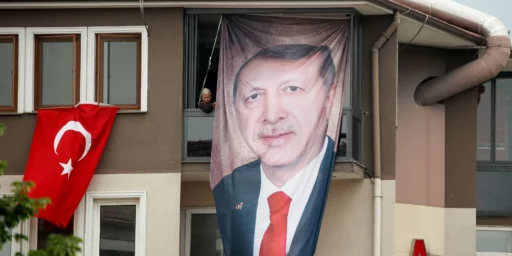
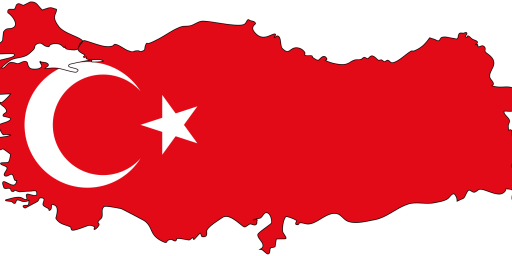
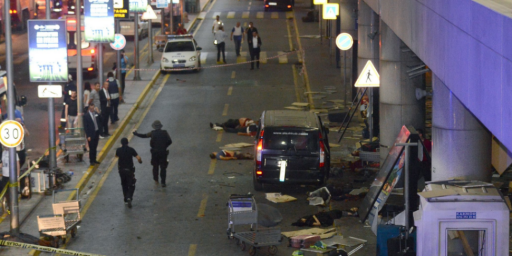
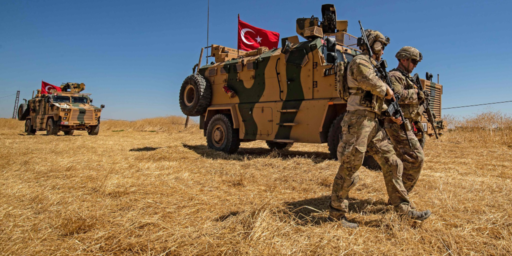
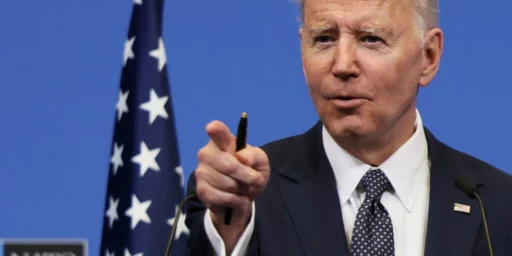
We need to have a private talk with Erdogan, talk about measures we could take to discourage US and European tourism in Turkey, like creating obstacles for international air travel. Threaten to put tariffs on Turkish goods. Have the Germans make noises about limiting remittances from Turkish workers. Erdogan will fold. His economy is already in the toilet.
@Michael Reynolds: More likely, as the post suggests, we are going to have to help him get some kind of short-term domestic politics win. The leverage is his re-election.
@Steven L. Taylor:
I don’t like being extorted, especially if it helps this prick. I’d rather velvet glove and iron fist. In the meantime we may have a sort of back door defense agreement in that the UK has jumped in ahead of us to offer defense to the Finns and Swedes. And of course there’s the fact that this Russian army likely could not take on Finland – they have a massive reserve, very tough terrain for tanks, and the Finns have F-35s.
Repeating from yesterdays forum:
The annoying thing is that the applications WILL have been cleared with Turkey in the pre-announcement diplomacy, and Erdogan is almost certainly reneging on private agreements made over the last three months.
Erdogan should be careful: at this point a lot of Europeans might prefer a suddenly announced new FYRE Treaty Organisation (F-something Y-something Recip Erdogan)
But most likely someone will pay whatever his price is to deal.
Probably cut price fighters and letting have his way in Syria.
Arguably Sweden/Finland is even better as a strategic asset than Turkey: locks up the Baltic, puts NATO really close to the Murmansk/Kola bases, and not that far from Archangelsk, for that matter.
BMD and anti-sub possibilities obvious.
OTOH, the current issues re grain shipping could get really major if this war drags on into autumn, let alone next year(“frozen conflict” pseudo ceasefire?) and Turks have the Montreaux Convention in their pocket.
On the gripping hand, is Ankara really going to risk getting itself out on limb alliance-wise with regard to a Russia it can never really trust re. the Straits? And Erdogan does not want Russia as China’s proxy in the Middle East either. (The slippery sod probably wants that bargaining chip for himself).
All in all, best find out what the SOBs price is, pay it, and be sure do him a bad turn at some point in the future. (Assuming he continues to rule in Turkey post ’23)
@Michael Reynolds: They won’t have F35s until 2025. However, they will do just fine with the F/A-18s.
The relationship with Turkey is difficult on many different fronts. They were rejected, I believe, from EU membership based, I suspect, because they were “different” non-European. They kanoodled with Russia buying the S-400 anti-air systems over US objections.
And like so much in the Middle East, we really don’t have a clue about the politics amongst all the players.
Russia has reportedly moved missiles capable of firing nuclear warheads close to the Finnish border.
@Michael Reynolds: None of those suggestions are legal under prevailing treaties. Making silly threats that violate international treaties is at once empty coming from NATO and EU and worthless as impossible to effectively action. It is Trumpian bluster.
Rather, financing side his bluster is similar to Putin’s.
Lira is on barely hidden slide to collapse. Annualised inflation is 70%+ (likely more). As FT reported just last week, semi-formal capital controls on companies making hard currency payments for Inputs / imports have been put in place. Erdogan economically is in a desperate situation and the Turkish Central Bank after being gutted of independence is playing Lebanese style games to mask. 70% inflation is hurting agri-interior as well as urban consumers as Erdogans’s strongman populist game is trying to (like a Sen. Warren) blame inflation on “greed” of companies, which flows back to farmers being unable to raise prices to meet rising inputs and fuels costs. It’s incoherent bricolage.
Some conditionalised carrots on funding and careful look at opposition. He might really fall with next election. Sweden and Finland need not be rushed for decision prior to his elections, plenty of preparations, etc. and using European clock-running.
Time alone is a fine stick right now. A very fine stick.
@Scott: Enough of the Muslims in one bucket idiocy. Turkey is not “the Middle East” – just because they’re Muslim doesn’t make them Middle East and frankly their political and socio-cultural weight in the Aegean coastal, they are not culturally in business nor politics anything like the Arab countries. The political system in Turkey is perfectly understandable, as are the actors. Really culturally not particularly different than what one sees with Greece and even southern Italy, the Balkans.
@JohnSF: Black sea. NATO already has Denmark and Norway for that choke point. So I find it hard to see how a Sweden and Finland are more strategically useful than Turkey. They are similar utility.
@Michael Reynolds:
Nor do I. Indeed, this story makes me angry.
Nonetheless, what you are suggesting may sound good, but is likely not practical. First, the damage is slow and longer-term and a short-term turnaround is needed. Second, if the US tries to damage Turkey, he can then tell his people that all the troubles in Turkey are the US’s fault, not his and he can play the Strong Man against the US (see, e.g., Cuba, as to how that works out).
The bottom line is that the likely best route is to pay him off in some way because the stakes and te options on the table dictate it.
Put another way: if it really was that easy to get sovereign states to behave the way we wanted, we would be doing it all the time and be getting cooperation aplenty.
Instead, history tells us it is simply not that easy.
@Lounsbury:
Increased ASW coverage of the northern part of the Baltic; northern Finland large area close to the Murmansk/Kola base complexes.
But as you say, it’s about even.
Which is why I’d say, pay what he asks.
Integrating Finland and Sweden fast is worth it (IIRC NATO membership is a legal requirement for full data integration? Anyone know definitively?)
IIRC Greece was recently objecting to letting Turkey back in to F-35 and re. extra F-16’s and F-16 upgrades.
That and accepting Turkish control over north Syria zone for repatriating refugees will be the main prices IMO.
@CSK:
They were close anyway: Murmansk and St. Petersburg naval bases are chock-full of nuclear capable platforms.
Murmansk is Russia’s main SLBM base.
Kola area also has both IRBM and bomber bases, IIRC.
Well, it may well be that the best strategy with regard to Erdogan’s antics is to work to generate as few headlines as possible, and let him continue to flounder in his domestic situation. He may well be past his sell-by date now.
I mean, how is what he’s been trying to do in Syria vs the Kurds on his border that different from Putin invading Ukraine? Trump gave him a green light, fer gawd’s sake. Has the mood shifted?
@Jay L Gischer: Ukranians are white. You cannot bomb white people. Putin should have known better.
If Zelensky, Biden, Macron and Johnson defeat Putin in Ukraine I’m will personally campaign for each one.
@Lounsbury:
Wait…I’m hearing you say all 2 billion Muslims are not the same.
My American brain cannot process this, please explain.
@DK:
I’ve said this before, I’ll say it again:
Take a bunch of Ukrainains, Romanians, Bulgarians, Greeks, Turks, Kurds, Syrians, Lebanese, Armenians, Georgians.
Dress them identically and mix them up.
Then see if you can pick out the “white” ones.
Culturally it’s a different thing: as Lounsbury notes, apart from being Muslim, the Turks are very similar culturally to south-east Europeans (see also, Bosnians and Albanians, both European and Muslim)
The demarcation is arguably between the old categories of “Near Eastern” or “Levantine” (used to be used for Christians, Muslims and Jews of the Balkans and the whole littoral zone of the S.Adriatic/Aegean/East Med/Black Sea) and the “inland Arabs” further south and east.
American “racial” categories don’t make much sense in the region.
@Lounsbury: You’re the one who put them all in one bucket. However, Erdogan has been pushing Turkey away from its Ataturk secular roots. Which moves them more out of the mainstream European culture. I am also fully aware of the differences between Turks, Arabs, Persians, and Kurds.
You have a tendency to want to score points rather than converse or enlighten. You should work on that.
@Scott:
Honestly, I think it was more simple than that: Greece is already in the EU and is blocking their entry. They’ve since made it much less likely others will fight to get them in, though.
@Scott:
The Turkish/EU differences are deeper than the recent emphasis towards Islamic identity of Erdogan and the AKP.
The main issue, arguably, is the hostility of Greece.
There is a tendency to mutual dislike that is historic; and particularly inflamed by the Turkish role in Cyprus. (Other SE European countries also have a problematic relation to their former imperial masters in Turkey)
– Secondly, with both Kemalists and AKP there has been a feeling that the several elites of Turkey rate political advantage over the rule of law.
– Third, and related, the issues of the Kurds, and the Armenians for that matter.
– Fourth, a certain geographical pernicktyness: European Union, while most of Turkey is in Asia, which in my opinion is cover for –
– Fifth, a feeling among some of the Christian Democrat political tradition in Europe, one of its main components (along with Liberals, Social Democrats, and Republicans) that a largely Muslim culture was rather alien. (And the politics of the ME best avoided)
– Sixth, that Turkey was too poor, populous and economically fragile to be integrated into the EU system without generating massive, and politically troublesome, economic stress, population shifts, and budgetary demands.
@JohnSF: Yep, all those cultural and political differences which I unfortunately reduced down to “different”. And, being simplistic again, from the Turkish point of view, they look at this as a rejection and then, naturally, start to look at the pro/cons of being a NATO member.
@Scott:
Yes. Some European commentators view the rise of AKP and then the turn of Erogan to “Middle East centred” policies as due to EU state ambivalence and dilatoriness re. Turkey being part of the “west” in general, and the EU in particular.
British foreign policy establishment, and Conservatives in particular, tended to advocate Turkey as a candidate.
Which, of course, made it the more dubious in the eyes of some in Paris and Brussels.
Most important factor IMO, though, was that, rightly or wrongly, nobody was willing to try to force the Greeks to give way on the matter.
Interesting, if irrelevant side-note:
If it were not for the fact that the son of the Turkish journalist and politician, Ali Kemal Bey, one Osman Wilfred Kemal, changed his surname to that of his mother’s mothers family, the current British Prime Minister would be Alexander Boris de Pfeffel Kemal. 🙂
I guess it is time to ask the age old question: How shall we fuck over the Kurds this time?
@CSK:
Isn’t the point of missiles that they don’t have to be stationed very close to the prospective targets? This sentence can also read “Russia as reportedly moved missiles capable of firing nuclear warheads closer to Finnish artillery.”
@Gustopher:
Yes, that’s true. It was probably a symbolic gesture on Russia’s part to remind the Finns that they can be obliterated.
@Scott: No I did not put them in one bucket you dim sod, rather I observed Turkish society and political culture in its dominant form is not Middle Eastern.
As for “However, Erdogan has been pushing Turkey away from its Ataturk secular roots. Which moves them more out of the mainstream European culture. I am also fully aware of the differences between Turks, Arabs, Persians, and Kurds.” Apparently you’re not given the absurd comment that Erdogan politics has pushed Turkey out of “mainstream European culture” (whatever that is. Northern Europeans presumably, versus the Greeks or the Bulgarians or the Macedonians, or the Cypriots or the Romanians, or best, the Hungarians).
The Turkey is not middle eastern and its politics are not inscrutable oriental whatever, they rather look like their Euro-Mediterranean & Balkan peers, and virtually nothing like Middle Eastern.
@JohnSF: It boils down to the EU Freedom of Movement clauses and fear of the poor Eastern interior which while neither economically nor demographically dominant, is indeed not Euro-med culture like the richer, dominant Aegaen west. Fear of a larger scale repetition of the Polish Plumbers problem. Plus of course Greek political childishness of the same sort that blocked Macedonia for years and years. Everything else is hand waiving excuses for those two fundamentals.
@JohnSF: Not merely journalist, an Ottoman minister as well.
@CSK:
To which the Finns will shrug Finnishly, and ask “What’s new?”
It’s exactly the sort of gesture that makes Finland calculate that NATO membership was a good idea in the the first place.
Not knocking at you here; more incredulous that the Kremlin can’t see that it’s exactly this sort of nuclear willy-waving that has encouraged all nearby states to join NATO.
Anyone know what the odds are for a bet on Belarus applying for membership by 2032?
And also if Sweden might dust off it’s plans from the 1960’s for nuclear weapons and the Saab 36 supersonic bomber project? (I’m not entirely serious, incidentally 🙂 )
Silly Russians.
@JohnSF:
Well, if Putin really is incapacitated by a serious illness, who knows what he’s thinking? Is he still a rational actor?
@CSK:
I think a lot of the time, the Russian state is working on autopilot.
Action = country shows disinclination to defer to Moscow.
Reaction = “We can nuke you! We can nuke you!”
See also Lavrov’s and Peskov’s repeated displays of idiotic rhetoric.
Rational actors or not, they stick to the classics:
As to what Putin himself is up to?
Heaven knows.
Assuming he isn’t sick, probably poring over the battle plans for the 121st Motor Rifle Battalion A Company operation seizing a schoolhouse outside Severodonetsk.
Or running over the FSI reports of Russian political activity versus the timelines for collapse of key industries.
Or writing begging letters to Xi Jinping.
Meanwhile, the General Staff frantically trying to cover up the state of the army stockpiles, working out ways to quietly coerce thousands of fat forty-five year olds into active service sans rifles, and how to trade rubles and scrap metal at a discount for gold and bonds with Dmitry Vilripyuoff in Almaty, Kazakhstan.